Tsushima ZP errors. Rozhdestvensky and the death of "Oslyab"
1. The Russian squadron was walking in two parallel columns most of the time since it established contact with the Japanese scouts. This became known to H. Togo, as a result of which the Japanese commander decided to abandon attempts to set up a “crossing T” and preferred to attack the left column of the Russians. The latter consisted of 2-th and 3-th armored units, that is, had Oslabyu at the head, and behind it were old Russian squadron battleships and coastal defense battleships who, without the support of the main squadron forces, are four squadron battleships of the Borodino type could not withstand the impact of 12 armored ships of the main forces of the Japanese. In other words, H. Togo believed that by attacking a weaker Russian column, it would inflict heavy damage to it, after which the fate of the 1 armored Russian detachment would also be resolved.
2. The attack of the left Russian column made sense only if the Russians had not had time to reorganize into a single wake column before it began. Z.P. Rozhestvensky set about rebuilding as soon as he saw the main forces of the Japanese, but rebuilt very slowly, increasing speed to 11,5 knots. and only slightly (of the order of 9 degrees.) having rotated successively at the intersection of the left column. As a result, the rebuilding of the Russian squadron was supposed to take about half an hour, but then, from the position of the Japanese flagship, it was almost imperceptible. In other words, the Russians gradually rebuilt, but H. Togo did not see this, and, obviously, believed that Z.P. Rozhestvensky has not yet begun rebuilding.
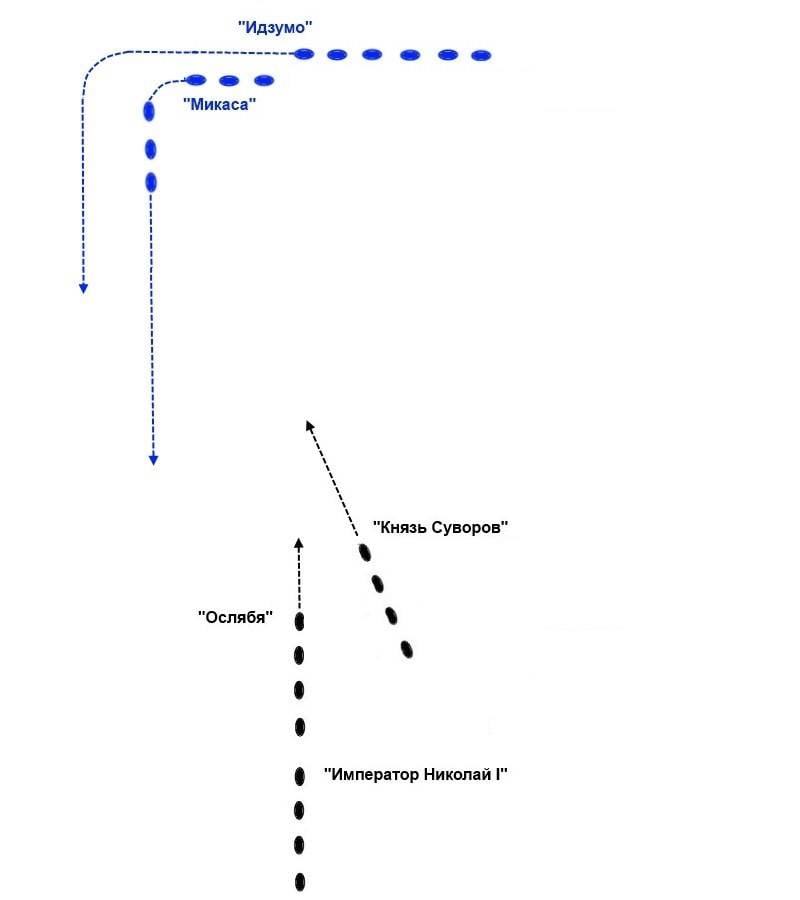
3. Thus, the Russian commander did everything so that the Japanese with all their strength fell on the left column, dispersed with it on the countercourse, but by the time the parties got close to the firing distance, they had to be met by 4 battleship Borodino, who had time to take their place in the head of the column.
In other words, Zinovy Petrovich had a great trap for the Japanese admiral. But what then did not work?
Error one, it’s the main one
Z.P. Rozhestvensky expected that at the end of the rebuilding, by the time his flagship returned to the NO23 course, Borodino, Alexander III and Orel would have enough space to fit between Prince Suvorov and Oslyaby. However, this did not happen, and when Suvorov completed the maneuver and lay down again on the course NO23, the Eagle was aboard Oslyabi. What went wrong?
Z.P. Rozhdestvensky is often accused of failing to calculate a relatively simple maneuver, but is this true? Oddly enough, the calculations show that the Russian commander did everything perfectly correctly. Investigation Commission Zinovy Petrovich explained his maneuver on the example of a right triangle, the hypotenuse of which was formed by the course of the 1-th armored detachment - four ships of the Borodino type, which took 29 minutes to exit across the course of the right column.
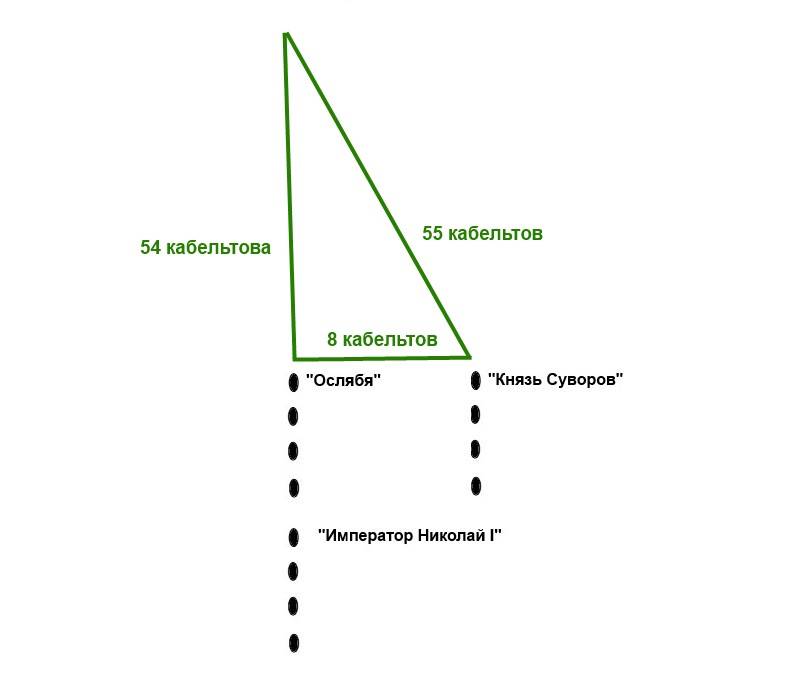
This is how Z.P. himself described this maneuver. Rozhdestvensky:
That is, by the time when “Suvorov” turned to NO23, its position and “Oslyabi” should have been like this
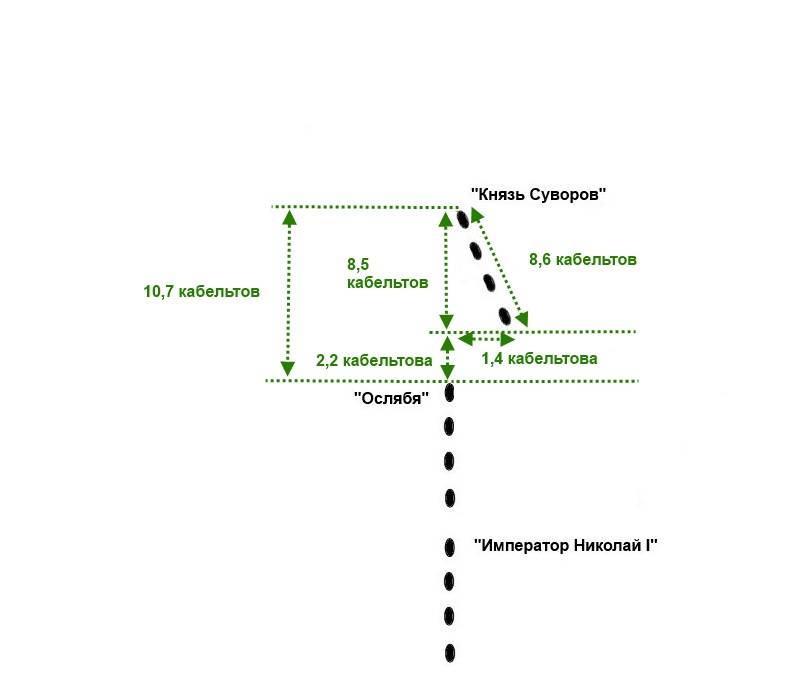
It is well known that the greatest length of the Borodino-type battleships was 121,2 m, and they walked at intervals in 2 cable. Accordingly, the length of the column 1 of the armored detachment was from the “Suvorov” stem to the stern of the closing “Eagle” 8,6 cable. The remaining calculations are very simple and show that the Z.P. Rozhestvensky left more than 2 cable between the Oslyab and the stern of the Eagle, which would be quite enough to restore the front's structure.
That is, in theory, entering the 1 of an armored detachment into the head of the Russian column should not have created any problem: nevertheless, it created, because, by the time "Prince Suvorov" returned to the course NO23, opened fire, " The Eagle was not in the 2 cable in front of the Oslyab, but on its traverse. What did the Russian admiral not take into account?
Z.P. Rozhestvensky suggested the following:
That is, according to Zinovy Petrovich, the problem was due to the fact that his small column of 4 battleships stretched out, and either Borodino fell behind Alexander III, or Orel fell behind Borodino.
It is quite possible, but, in the opinion of the author of this article, not only (and not so much) the commanders of Borodino or Orel are to blame for this, but also the confusing order of Z.P. Rozhdestvensky. He ordered the 1 armored detachment to hold the 11 nodes, but the “Suvorov” - 11,5 ties. Obviously, the admiral's calculation was that Alexander III, Borodino, and the Eagle would orient themselves on Prince Suvorov and would select such a number of revolutions of their cars to follow the front matelot, observing the prescribed 2 cable interval.
On the one hand, this is, of course, the right decision, because, given the uneven acceleration of the ships, it is still easier to catch up with the outgoing matelot than to slow down if your battleship picked up speed faster than those ahead of it. That is, when rebuilding, in any case it is safer to make a maneuver that will increase the intervals between the ships than the one that can reduce these intervals. But all this is correct only for those cases where an increase in the length of the column for some time cannot lead to any sad consequences, but in the case under consideration this was not the case.
In general, it can be stated that Z.P. Rozhestvensky, planning a maneuver of the “return” of battleships of the 1 squad to the head of the column, “designed” it correctly, but too much at the same time. He proceeded from the fact that Oslabya runs exactly 9 nodes, and believed that the 11,5 ties that the Prince Suvorov would develop would give him, given the time to disperse from 9 ties. Medium speed (11,25 knots) is enough to change lanes. But any, even minor deviations - say, “Oslyabya” goes a little faster than 9 nodes, or the average speed of the 1 armor unit will not be 11,25, but closer to 11 nodes - and the distance between Oslyaby and Eagle at the time of completion maneuver will be less than 2 cable. And this means that Oslyab will have to shorten the course in order to enter into service with the Eagle, and observe the prescribed two-cable interval.
Well, after that exactly what happened happened - maybe Oslyabya and the right column of the Russian battleships moved a little faster than Z.P. Rozhdestvensky, maybe “Suvorov” went slower, and it is quite likely that Borodino or Eagle could stretch the prescribed interval - one of these reasons, or some combination of them led to the fact that instead of a brilliant rebuild of 1 armored detachment, in which the "Eagle" was supposed to be about two cables in front and in 20-30 m to the right of the Oslyab course ... it turned out what happened.
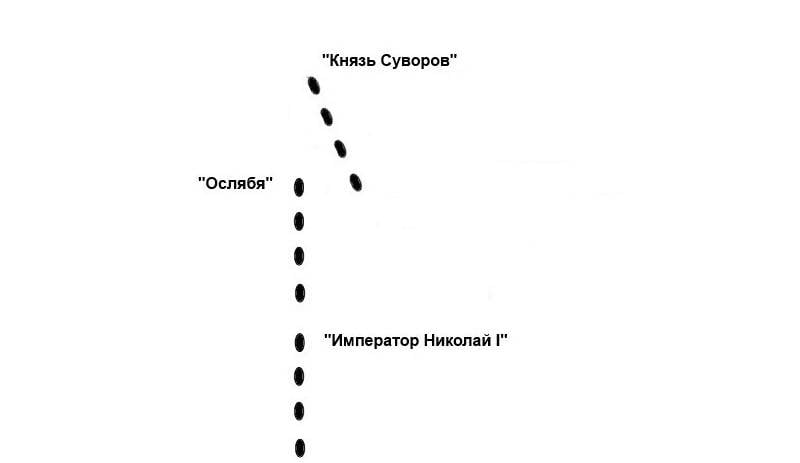
ZP error Rozhestvensky was that when planning a maneuver, he should have laid a small (at least another pair of cables) “margin of safety” for any kind of error, but he did not do that. And maybe he did, but he incorrectly estimated some parameter (the speed of Oslyab, for example) and was mistaken in his calculations.
Error two - possibly non-existent
They concluded that Z.P. Rozhestvensky, after turning "Prince Suvorov" reduced its speed to 9 nodes.
The fact is that with the "Prince Suvorov" Russian admiral, completing the rebuilding, could not estimate exactly where the "Eagle" is relative to "Oslyabi". Even with perfect visibility (for example, if Alexander III and Borodino suddenly became transparent), it would be all the same to understand whether the Eagle is on the traverse of Oslyabi, or if it is ahead of it by a couple of cables it would not be so easy the two Russian battleships marching between the Prince Suvorov and the Eagle were not transparent at all. It turned out that Z.P. Rozhestvensky remained confident that Oslyabya would be able to get into the Eagle's wake without any problems, and this was absolutely not the case.
It is necessary to take into account such a moment. Theoretically, the Russian commander, in addition to the two cables laid between them “Oslyabye” and “Eagle” “put” into the maneuver, had another handicap. The fact is that battleships of the 1 squad, of course, could not reduce the speed from 11,5 to 9 knots. all at once, such a “stop” is impossible even for a passenger car. Armadillos of the Borodino type could only do this gradually, that is, until the speeds were equalized, the distance between the 1 armored detachment and the column of the 2 and 3 units would continue to increase.
In other words, suppose that the battleships of the 1 squad reduced the speed from 11,5 to 9 knots. for 1-3 minutes, respectively, the indicated time they would go at an average speed of 10,25 knots, which on 1,25 knots exceeded the speed of Oslyabi and the right column. That is, during the time while the 1 armored detachment dropped speed, the distance between Oslyabye and Eagle would have increased by 0,2-0,6 cable in addition to the 2,2 cable that Z.P. Rozhdestvensky.
Why did not Zinovy Petrovich align the columns in another way? After all, he could not reduce the speed of the 1-th armored detachment to 9 nodes, and instead order the Oslyab, and the ships following him to increase the speed from 9 to 11 nodes. This option looks great until you think about such a maneuver properly.
Although opinions on the relative position of the Russian and Japanese squadrons at the time of the opening of the fire differ, we take as a basis the description of our official stories: the turning point of the Japanese squadron was located in 32 cable and on 4 rumba (45 degrees) to the traverse of the Suvorov. At the same time, after the turnaround, the Japanese ships lay down on a parallel, or almost parallel, Russian squadron course.
Following the previous course at the speed of 9 units, the Russians were approaching the turning point of the Japanese squadron, while if the ships of H. Kamimura turned after H. Togo (and at the beginning of the Japanese turn everything looked like that), at the moment when the last Japanese armored the cruiser would pass the turning point (14.04) it would be abeam "Prince Suvorov" approximately 22,5 cable from him, while the distance from the end of the Russian to the end of the Japanese ship would be approximately 36 cables, as shown in Figure 1.
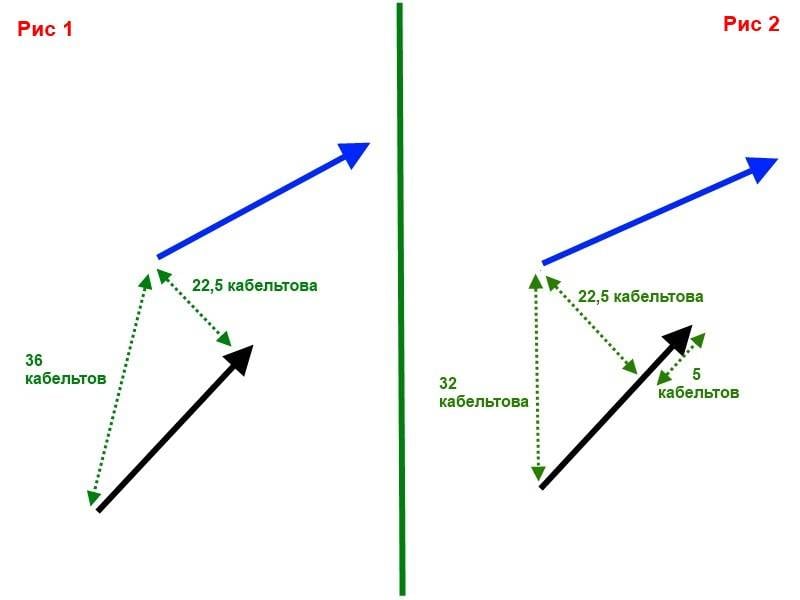
Well, if the Russian column went on the 11 nodes, it would have moved forward on the 5 cable (Figure 2).
So, in terms of tactics, ZP Rozhestvensky did not have to make any maneuvers, but had to go the same course, approaching the turning point: in this case, an increasing number of Russian ships could participate in the battle, firing with the left side. From this point of view, it would be more useful to go on 11 nodes, since in this case the terminal Japanese ship, having completed the turn, would have appeared not on the traverse of “Suvorov”, but almost on the traverse of “Borodino”, but would not be separated from the terminal Russian ship. 36, but only 32 cable.
But it must be understood that in this case the Russian commander, approaching the trailing Japanese, would substitute the head of his column for concentrated fire of the entire Japanese line. And here Z.P. Rozhestvensky had to choose a compromise speed that would provide his ships with the best conditions for firing at the Japanese passing the turning point, but at the same time did not put Suvorov, Alexander III, etc. too hard. under the fire of the Japanese line. And in this respect, 9 nodes seemed to be more optimal than 11 - even from today's position.
Interesting and more - Z.P. Rozhestvensky believed that the time of the Japanese rebuilding could be less than it was in reality, and that X. Togo could be packed in 10 minutes. In this case, it would have turned out that “Suvorov”, following on the 9 nodes, would not have reached the traverse of the end armored cruiser X. Kamimura approximately the 7,5 cable length. Then, at least theoretically, the Russian squadron received the opportunity, turning successively to the left, to pass under the stern of the Japanese system.
In addition, the speed in 9 nodes had other advantages. Obviously, it would be much easier to slow down the speed of the 1 armored detachment, than to increase the speed of the 2 th and 3 th. In this case, for some time they would have lagged behind the battleships of the Borodino type, and it’s not a fact that the system would have been preserved at all - N.I. Nebogatov could delay, etc. Recall that Zinovy Petrovich was of the lowest opinion about the rafting of 2 and 3 of Pacific squadrons: despite the regular maneuvers with N.I. Nebogatovym he could not get him to fulfill his orders.
In other words, Z.P. Rozhdestvensky could, of course, give 11 nodes, but at the same time the chances that his convoy of 12 armored ships would stretch were too great, and the end ones would still remain almost as far from the turning point of the Japanese as if the squadron was on 9 nodes . That is, rushing towards the Japanese, the Russian commander won little for the ships of the 2-th and 3-th units, but at the same time more strongly substituted his best ships under the concentrated fire of the Japanese.
“Well,” the respected reader will say: “But if the author is sure that the squadron speed in the 9 nodes really was optimal in that tactical situation, why did he put her in the blame for Z.P. Rozhdestvensky, her number as the error of the Russian commander? ". The answer is very simple.
Z.P. Rozhestvensky should first complete the rebuilding, make sure that all the battleships of the 1 squad returned to the previous NO23 course, and Oslyabya followed them into the wake and only then reduced to speed to 9 nodes. In the article devoted to the ways in which a high-speed squadron can set up a “crossing T” to a slow-moving enemy, the author ventured to say that any maneuver performed before the previous one was completed could lead to chaos. This is exactly what we see in this case - when the “Prince Suvorov” turned on NO23 and opened fire, the 1th armored detachment had not yet completed the rebuilding, and did not lay down, following the flagship, on NO23. Save Z.P. Rozhdestvensky speed in the 11,5 node for a short while, and the Eagle, which turned out to be on the crossbar of Oslyabi in 13.49, would continue to slowly overtake the flagship, alas, the late DG Felkerzam, which would greatly facilitate the head battleship of the 2 squadron to turn into a wake "Eagle." But Z.P. Rozhestvensky began a new maneuver, without completing the previous one: he reduced speed before all the 4 battleships of the 1 squadron were laid down on NO23. And this is what should be considered a mistake of the Russian admiral.
In other words, there was no mistake in leading the squadron to the 9 units in the current situation: the mistake was that Z.P. Rozhdestvensky reduced the speed of his 9 armored unit to 1 nodes too early.
But what is interesting: it is possible that Z.P. Rozhestvensky did not make this mistake. Many sources (for example, AS Novikov-Priboy) indicate that “Prince Suvorov” reduced the course to 9 nodes immediately after turning to NO23, but there is evidence to the contrary. So, for example, M.V. Ozerov, commander of the squadron battleship "Sisoy the Great" in the testimony of the Investigation Commission stated:
Unfortunately, our official history does not comment on this point in any way: it is possible, precisely because the testimony of the squadron officers is too contradictory for a certain verdict on this issue to be made.
Error three, which is not a mistake at all
This error is considered signal Z.P. Rozhestvensky, who he raised right after his flagship turned to NO23: "The 2 squad to be in the wake of the first."
Interestingly, the members of the Historical Commission at the Naval General Staff, who made up the official “Russian-Japanese War 1904-1905”, consider giving this signal completely wrong action of the admiral, calling it “a petty alignment of his squadron”. But let's think - could Z.P. Rozhdestvensky not give a similar signal? Before the main forces of the Japanese were discovered, the 1 armored detachment maneuvered separately from the rest of the main forces, forming the right column of the Russian system. Now he went to the rest of the head, but "Prince Suvorov" completed the rebuilding just to the right of the Oslyab course. In other words, Z.P. Rozhestvensky obviously wanted to rebuild the main forces into a single wake column, regaining control, but how could his flagships guess this? Do not lift the Russian commander of this signal, and on Oslyab, one would only have to guess if Z.P. Rozhdestvensky, so that 2-th and 3-s armored units follow him, or does he prefer to continue to maneuver only four of his battleships of the Borodino type of the 1-second squad? In other words, the Russian commander was supposed to let know at Oslyaby what he expected from the ships he was leading joint maneuvering, that was the meaning of the order to the 2 squadron to be in the wake of the first.
Thus, this indication was absolutely necessary, and the only question is to understand how timely it was. Maybe it made sense to raise it only when the 1-th armored detachment in full returned to the course NO23? Hardly: by the time when only “Prince Suvorov” turned to NO23, he was clearly visible from “Oslyab”, but already after “Alexander III” would have been able to examine the signals on “Oslyab” in the wake of “Osliab” Suvorov "were not too large. And when three battleships would line up between Oslaby and Prince Suvorov, the chances that the flagship of the 2 armored detachment would be considered a signal from the Russian commander were completely illusory. True, for this there existed “Pearls” and “Emerald”, which were out of line, and served also as repetitive courts. They should have transmitted any signal from the commander to Oslaby, but, possibly, in the outset of the battle of Z.P. Rozhestvensky was afraid to rely only on them alone.
Error four. But whose?
And, in fact, what did all the mistakes of the Russian admiral above lead to? The answer seems to be obvious: due to the mistakes of Z.P. Rozhdestvensky squadron battleship "Eagle" was not ahead of "Oslyab", as intended, but on its traverse, and even began to reduce the course, equalizing it with "Oslyaby." As a result, the commander of the flagship battleship of the 2 squad had nothing left to do, in order to execute the order of the commander, first reduce the turn to the smallest, and then stop at all, letting the Eagle go ahead. As a result, the Japanese had an excellent opportunity to practice shooting at a standing target, and quickly achieved success, inflicting "Oslyab" the most severe damage that predetermined the rapid death of the ship. It is so?
If we proceed from the maxim, according to which the commander is responsible for all the actions of his subordinates - then, of course, it is. But let's think a little over what I did in the period from 13.20 to 13.49 and a little after that, the commander of the squadron battleship Oslyabya V.I. Rem.
So, before 13.20, 1, the armored detachment, went parallel to 2 and 3, but then “Prince Suvorov” turned, and went across the course “Oslyabi”. So, what is next? Long 29 minutes Vladimir Iosifovich Baer had the opportunity to observe the execution of this maneuver. Doubt in its meaning was hardly possible - it is obvious that in view of the main forces of the enemy, Z.P. Rozhestvensky was going to lead the right column, led by Oslaby. And if Zinoviy Petrovich didn’t see that in the course of rebuilding his trailing “Eagle” does not have time to pass in front of “Oslyabye”, then at Oslyab itself it was evident long before the real threat of a collision was created!
But what does V. I. Baer do about this? And nothing. He had the opportunity to see the danger in advance, and to preempt it — all that was needed for this, which was to slightly reduce the speed of travel. The powers of such a flagship 2-th armored detachment, of course, were. But no — instead, Vladimir Iosifovich continues to the utmost to carry out the order given earlier and follows the established course at a given speed, and then, when the collision is almost inevitable, he stops his battleship because of the enemy, without even thinking about letting the ships following him!
Recall the testimony of Lieutenant Ovander from the battleship "Sisoy the Great", who followed directly after "Oslyabye":
There is no doubt that it is absolutely incorrect to compare warships and cars, but anyway, at least some experienced driver knows how dangerous a situation is created when in a convoy of vehicles following certain intervals, the head driver sharply “hits” the brakes similar arranged following ships I. I. Rem.
In other words, Z.P. Rozhestvensky, of course, made a mistake when rebuilding: for some of the reasons listed above, he created a situation in which the “Eagle” did not have time to pass in front of “Oslyabye”. But his mistake was easily corrected by V. I. Beer, to whom this error was obvious long before the situation took on an “emergency” character. It is very difficult not to understand the threat of a collision when the battleship of the 1 squad slowly “rolls” onto your ship! But V.I. Baer did absolutely nothing, and his inaction ultimately led to the fact that Oslyab had to not only lose the course, but would stop completely under enemy fire.
V.I.Ber could well have reduced the course in advance by skipping the battleships of the 1 squad of Z.P. Rozhdestvensky. But even bringing the situation to the threat of a collision, he still could not go into the wake of the “Eagle”, but go a little to the right or left, dropping the course and closing the “Eagle” or “hiding” behind him: but when the latter comes forward , then have him go to the waterfront. Yes, in this case the "Eagle" or "Oslyabya" would "double", and one of them would not have been able to shoot at the Japanese ships. But still, it was much better than leaving his battleship under fire without moving, also forcing an emergency braking of the ships of the 2 squad following the Oslyabyi.
In other words, Z.P. Rozhestvensky, of course, made a mistake, but only the actions of V. I. Baer, which appear to the author of this article to be completely illiterate, led to the fact that this error turned into a catastrophe — the death of Oslyabi at the very beginning of the battle.
And again - wasn’t Z.P. Rozhestvensky responsible for the preparation of their flagships? You can, of course, assume that he simply intimidated his commanders to a degree completely incompatible with independent decisions. But remember that, left without the leadership of the flagship, the commander of the battleship Alexander III acted more than intelligently: he led his ship between the cruisers H. Kamimura and the battleships X. Togo, in order to pass under the stern of the Japanese squadron 1: this maneuver was extremely dangerous for Alexander III, but negated the tactical advantage that the Japanese had gained by this time. In essence, Nikolai Mikhailovich Bukhvostov sacrificed his battleship for the sake of an attempt to rescue the squadron: such a solution can be considered whatever, but the term “inert-free” is obviously inapplicable to it. So, it can be assumed that the commanders of the 2-nd Pacific Squadron were not so scored.
According to the author of this article, the case was as follows. On the Oslyab, the rear admiral and commander of the 2 armored detachment, Dmitry Gustavovich von Felkersz, kept his flag, who made the main decisions, and V. I. Baer remained, as it were, “in the shadow”, only the executor of the admiral's will. But in Kamrani, D.G. Felkerzam had a stroke, and he died a few days before the battle. As a result, V.I. Rem was not only at the head of the battleship, but also at the head of the entire 2 armored detachment, completely unprepared for such responsibility.
At the end of this article, it remains only to add that the author has too far evaded the history of the Pearl and Emerald armored cruisers, and in the next article I will gladly return to them. As for the actions of Z.P. Rozhdestvensky in the outbreak of the battle, another article will be devoted to them, in which the author will try to figure out how effectively the Russian squadron was able to take advantage of those 15 minutes of the position that Zinovy Petrovich Rozhestvensky gave her.
To be continued ...
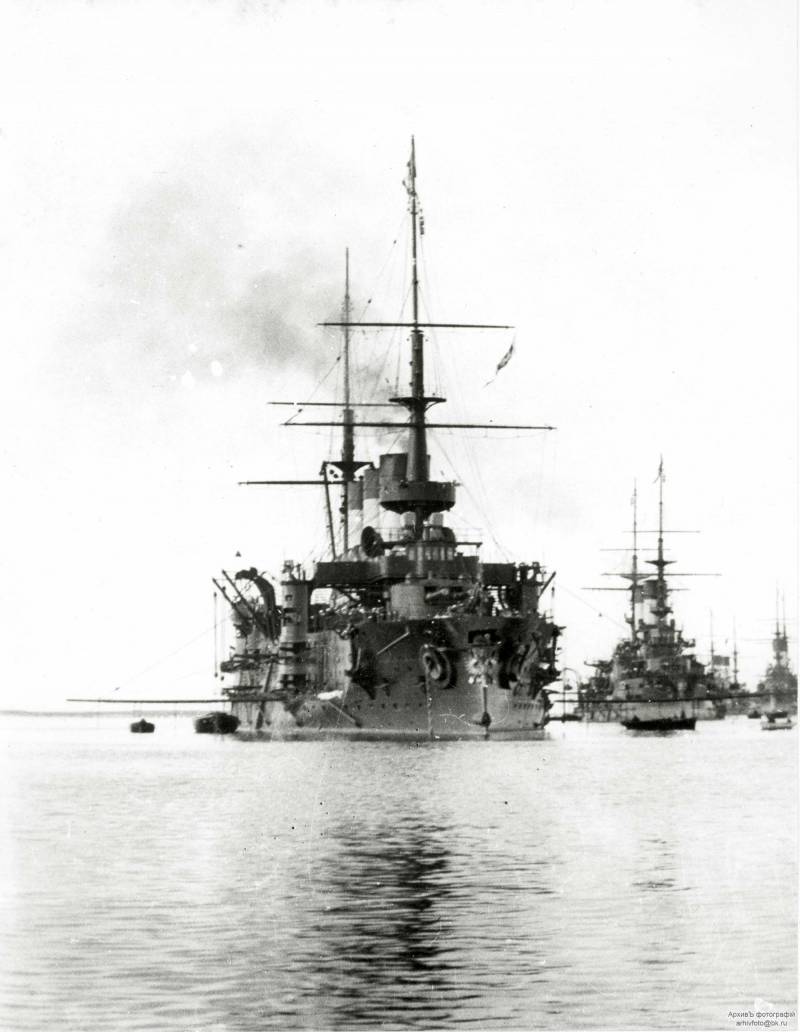
Information